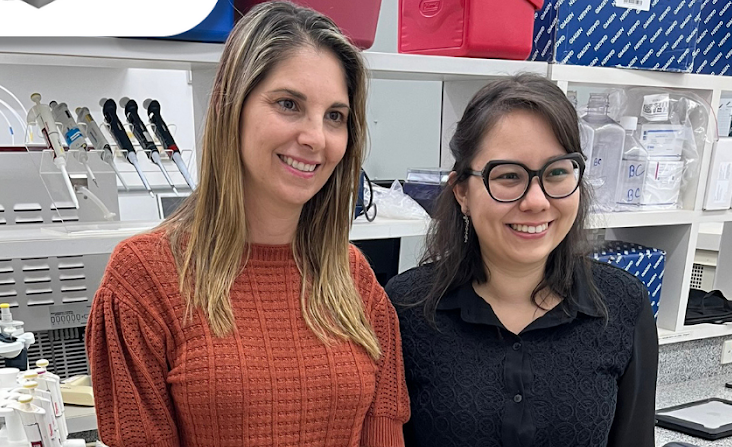

Virgínia Picanço e Castro and Renata Nacasaki Silvestre, researchers at the USP Ribeirão Preto Blood Center (photo: press release)
Nominated in the “Technological Innovation in Oncology” category, the study could benefit patients with hematological neoplasms.
Nominated in the “Technological Innovation in Oncology” category, the study could benefit patients with hematological neoplasms.

Virgínia Picanço e Castro and Renata Nacasaki Silvestre, researchers at the USP Ribeirão Preto Blood Center (photo: press release)
By Emilio Sant’anna | Agência FAPESP – Research that led to the development of a cell therapy for hematological neoplasms – diseases caused by the uncontrolled proliferation of blood cells – has won the 15th Octavio Frias de Oliveira Award in the “Technological Innovation in Oncology” category. The ceremony, organized by the São Paulo State Cancer Institute (ICESP) and the Folha de S. Paulo newspaper, took place on the 8th of August.
The award was given to researchers Virgínia Picanço e Castro and Renata Nacasaki Silvestre, both from the Ribeirão Preto Blood Center of the University of São Paulo (USP). They are the authors of a study supported by FAPESP and published in the journal Frontiers in Immunology. The research was conducted within the framework of the Cell Therapy Center (CTC) and the Nucleus of Cellular Therapy (NuTeC), respectively a Research, Innovation and Dissemination Center (RIDC) and a Science for Development Center (CCD) of FAPESP.
The group developed an immunotherapy using immune system cells called NK (natural killer) cells. Through genetic modification, they inserted a chimeric antigen receptor (CAR) into the lymphocyte to create a CAR-NK, a cell capable of recognizing and attacking cancer cells. Treatment with these modified lymphocytes could result in a more accessible option compared to other alternatives, such as CAR-T cells – a therapy in which the chimeric antigen is inserted into T lymphocytes instead of NK cells (read more at agencia.fapesp.br/31675 and agencia.fapesp.br/39048).
In addition to a superior response to CAR-T, CAR-NK cells have another advantage: they can be kept in culture, which makes them less expensive to use once manufactured. “The biggest impact, if all goes well, at the end of the clinical trials, is to have a more affordable therapy. A CAR-NK can be manufactured for several patients, unlike a CAR-T, which is only for one patient,” says Picanço. “It’s a completely Brazilian technology, we were able to develop it at the university. I think it’s a breakthrough.”
In the “Research in Oncology” category, the winners were Patrícia Martins and Kátia Morais, who participated in research that led to the discovery of biomarkers for the treatment of cervical cancer – the third most common cancer among women in Brazil, according to the country’s National Cancer Institute (INCA).
The study, developed by the Albert Einstein Teaching and Research Center and published in the journal Scientific Reports, shows the positive response to chemoradiotherapy treatment in patients with a specific immune profile. Those who responded best were those with a higher number of defense cells (tumor-infiltrating lymphocytes – TILs).
According to Morais, the identification of biomarkers for cervical cancer can bring clinical relevance to treatment. “When people think of the immune system, they think that the more it’s activated, the better. But that’s not necessarily true. You have to have a mechanism for regulating the immune system, and what we saw in our cohort is that patients who don’t respond to treatment have a lack of control of that system, it’s unbalanced. In other words, this regulatory mechanism is somehow compromised,” says the researcher.
The person chosen as “Outstanding Personality” was the oncologist Gilberto Schwartsmann. A member of the Brazilian Academy of Medicine, professor of Oncology at the Faculty of Medicine of the Federal University of Rio Grande do Sul (UFRGS), and a writer, he highlighted the work and perseverance of the award winners and the work of FAPESP. “[Jorge Luis] Borges said that when an author writes, he has all those who lived before him in those paragraphs. In science and medicine, we have the people who guide us and make us what we are,” he says. “The institutions that promote research in the country, but especially in São Paulo, play a fundamental role. The research environment at the universities and the work of FAPESP are decisive for much of what happens in Brazilian science,” he emphasized.
Republish
The Agency FAPESP licenses news via Creative Commons (CC-BY-NC-ND) so that they can be republished free of charge and in a simple way by other digital or printed vehicles. Agência FAPESP must be credited as the source of the content being republished and the name of the reporter (if any) must be attributed. Using the HMTL button below allows compliance with these rules, detailed in Digital Republishing Policy FAPESP.





